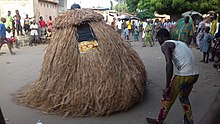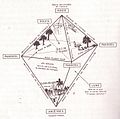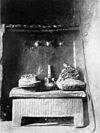Portal:Traditional African religions
Introduction The beliefs and practices of African people are highly diverse, including various ethnic religions. Generally, these traditions are oral rather than scriptural and are passed down from one generation to another through folk tales, songs, and festivals, and include beliefs in spirits and higher and lower gods, sometimes including a supreme being, as well as the veneration of the dead, and use of magic and traditional African medicine. Most religions can be described as animistic with various polytheistic and pantheistic aspects. The role of humanity is generally seen as one of harmonizing nature with the supernatural. In the past, African religion used to be referred to as 'traditional' but this is no longer appropriate. 'Traditional' was used to distinguish Africa religion from Abrahamic religion which came to the continent as a result of proselytism. Colonialism supported the false view that Africa had no religion. (Full article...) Selected articleTraditional healers of Southern Africa are practitioners of traditional African medicine in Southern Africa. They fulfill different social and political roles in the community, including divination, healing physical, emotional and spiritual illnesses, directing birth or death rituals, finding lost cattle, protecting warriors, counteracting witchcraft, and narrating the history, cosmology, and myths of their tradition. There are two main types of traditional healers within the Nguni, Sotho-Tswana, and Tsonga societies of Southern Africa: the diviner (sangoma), and the herbalist (inyanga). These healers are effectively South African shamans who are highly revered and respected in a society where illness is thought to be caused by witchcraft, pollution (contact with impure objects or occurrences) or through neglect of the ancestors. It is estimated that there are as many as 200,000 indigenous traditional healers in South Africa compared to 25,000 Western-trained doctors. Traditional healers are consulted by approximately 60% of the South African population, usually in conjunction with modern biomedical services. Selected imagesFestivalsThere are several religious festivals found in the various Traditional African religions. Some of these are listed below next to their corresponding religion :
Selected biographyOgotemmeli (died 1962) was the Dogon elder and high priest (Hogon) who narrated the cosmogony, cosmology and symbols of the Dogon people to French anthropologist Marcel Griaule during the 1930s, 1940s, and 1950s, that went on to be documented and adapted by contemporary scholars. A lot of what we know about Dogon religion, cosmogony and symbolism came from Griaule's work, which in turn came from Ogotemmeli—who taught it to him. Selected quote
Roger S. Gottlieb Source: Gottlieb, Roger S., The Oxford Handbook of Religion and Ecology, Oxford University Press (2006), p. 261, ISBN 9780199727698 [1]
Did you know
Related portalsTopicsFor more Traditional African religion topics, see Category:Traditional African religions.
CategoriesWikiProjectsThings you can doAssociated WikimediaThe following Wikimedia Foundation sister projects provide more on this subject:
Discover Wikipedia using portals |





































